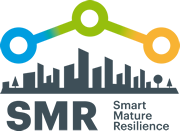Policies
Effort
Effort taken to learn from what other stakeholders do to increase resilience
Results
Percentage of lessons learned implemented per lessons learned identified
Description
At this stage, a resilience culture strategy is in place, a desk-based review has been undertaken of best practices and communication and promotion work has been going on to share the concept of resilience. At this point, this process is made official with regular information sessions.
Case study
Glasgow: Engaging city stakeholders in regular discussion around resilience
Summary
Through this initiative Glasgow sought to embed resilience into decision making at a Community Planning level across the city and ensure that all city stakeholders were involved in the implementation of resilience.
More information
 Relevant City Context
Relevant City Context
For any city wishing to embed resilience into city frameworks, then it is essential that key city stakeholders are continually involved in discussion, implementation and institutionalisation of resilience.
Goal: to promote procedures to involve stakeholders in the implementation of the resilience action plan
As part of the review of the Community Planning Process in Glasgow, three central focus themes have been established. These are:
Economic Growth
Including issues such as: Raising Health, Skills for All, Supporting our Key Sectors, Innovation/High Value Employment, Smart Infrastructure Investment, Supporting Enterprise, Linking Education to Employment Opportunities, Increasing our Population.
A Fairer and more equal Glasgow
Including issues such as: Work and Worth, Dealing with negative attitudes to those living in poverty, Child Poverty, Credit and Debt, Participation of citizens in shaping and making decisions about the places and services that affect their lives and Glasgow’s future.
Resilient Communities
Including issues such as creating a “thriving places” approach to area focused regeneration in Glasgow as a better way of working between organisations and communities at a very local level, making better use of existing resources and assets to achieve better outcomes. Making connections with people in neighbourhoods, supporting them to identify, articulate, and fulfil their aspirations that they have for themselves and their communities. Mental Health and Mental Wellbeing, Social Isolation, Empowering Glaswegians.
The ethos is that it does not matter where you live, working or not, younger or older; everyone in the city can benefit by getting these things right.
Whilst City resilience is embedded across all of the focus themes, key delivery will be under the theme of Resilient Communities. This means that there will be a regular meeting framework, focussed discussion, action and learning around this theme.
Cooperation amongst Stakeholders
This process will include several key city stakeholders including police, fire and rescue, housing associations and community representatives.
Resources
Each stakeholder would be required to attribute staff resource, redefine priorities and allocate their own funding, where possible, to further action in terms of Resilient Communities across the City.
Outcome
Embedding resilience as a theme has been an important step in the city’s resilience journey. This will now allow for more formal structured processes which will allow issues of resilience to be considered on a long term basis across the city. The full outcome of influencing this process has not yet been realised but the regular meeting structure, diversity of stakeholders and accountability for action in relation to community planning ensure that this will be part of a concerted effort amongst city stakeholders in the city.
Subscribe to our newsletter

This project has received funding from the European Union’s Horizon 2020 research and innovation programme under grant agreement no. 653569.
